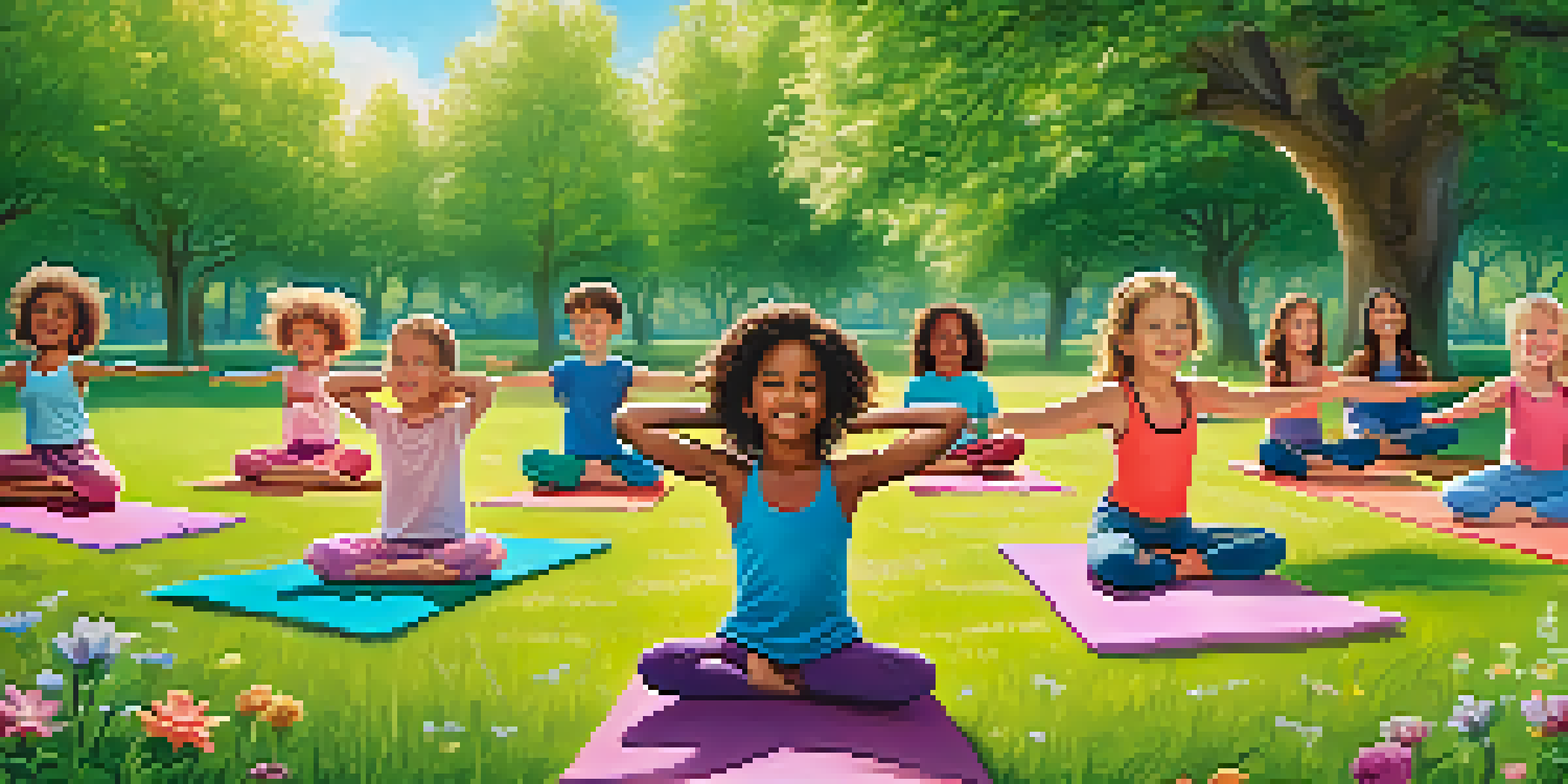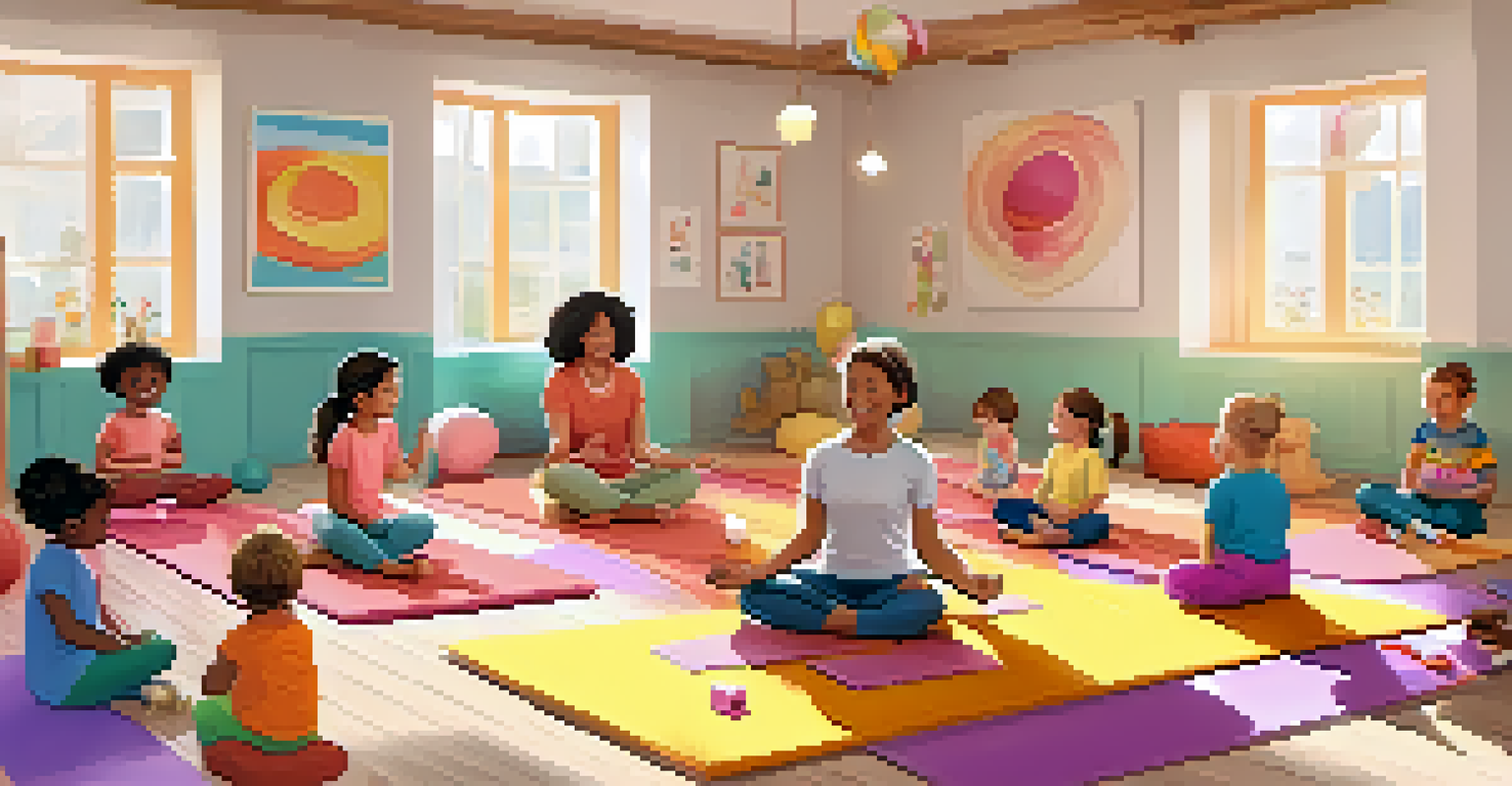Yoga for Kids: Promoting Physical Health and Well-Being

Understanding the Importance of Yoga for Kids
Yoga is more than just a trendy exercise; it offers numerous benefits for children. It promotes physical health, balancing strength and flexibility while also enhancing concentration. With the increasing prevalence of sedentary lifestyles among kids, incorporating yoga can be a fun way to encourage movement.
Yoga is the journey of the self, through the self, to the self.
Additionally, yoga fosters a positive mindset by teaching children how to manage their emotions and stress. By practicing mindfulness through breathing exercises, kids can learn to navigate challenges with greater ease. This holistic approach to health is vital in today’s fast-paced environment.
Moreover, yoga helps instill lifelong habits of wellness. When kids engage in yoga from a young age, they are more likely to carry those habits into adulthood. This foundation not only supports their physical well-being but also nurtures their mental and emotional health.
Physical Benefits of Yoga for Children
One of the most noticeable benefits of yoga for kids is improved physical fitness. Regular practice can enhance strength, flexibility, and coordination, which are essential for various activities, from sports to everyday play. For instance, poses like Downward Dog and Warrior can help build muscle tone and increase endurance.

Yoga also encourages better posture, something that’s increasingly important with the rise of screen time. By promoting awareness of body alignment, children learn to sit and stand correctly, reducing the risk of discomfort and injuries. This awareness can have a lasting impact as they grow.
Yoga Enhances Kids' Physical Health
Regular yoga practice improves children's strength, flexibility, and posture, promoting overall fitness.
Additionally, yoga can aid in developing motor skills. Simple movements and poses require balance and control, helping kids refine their coordination. This improvement not only supports athletic abilities but also boosts confidence as they master new skills.
Mental Health and Emotional Regulation Through Yoga
Yoga is a powerful tool for enhancing mental health in children. Through mindfulness and breathing techniques, kids can learn to calm their minds and manage anxiety. It provides a safe space for them to express emotions, which is invaluable during the often tumultuous childhood years.
The body is your temple. Keep it pure and clean for the soul to reside in.
Practicing yoga encourages self-awareness and reflection. Kids can explore their feelings and thoughts more deeply, helping them understand their reactions to various situations. This emotional intelligence is crucial, as it lays the groundwork for healthier relationships and effective communication.
Furthermore, yoga helps children develop resilience. By facing challenges on the mat—such as holding a difficult pose—they learn perseverance. This skill translates into their daily lives, equipping them to handle obstacles with a positive attitude.
Social Benefits of Group Yoga Classes for Kids
Participating in group yoga classes offers children a unique opportunity to build social skills. As they practice together, kids learn the importance of teamwork, respect, and communication. This shared experience fosters friendships and a sense of community among peers.
Moreover, group classes encourage inclusivity. Children from different backgrounds can come together, sharing their experiences and perspectives while practicing yoga. This diversity enriches their understanding of the world and promotes empathy.
Yoga Supports Mental Well-Being
Mindfulness and breathing techniques in yoga help children manage anxiety and build emotional intelligence.
Additionally, practicing yoga in a group setting can reduce feelings of isolation. Kids learn that everyone faces challenges, and together they can support one another. This camaraderie can significantly enhance their overall happiness and well-being.
Incorporating Yoga into Daily Routines for Kids
Integrating yoga into a child's daily routine doesn’t have to be daunting. It can start with just a few minutes each day, gradually building up as they become more comfortable. For instance, morning stretches can help them wake up their bodies and set a positive tone for the day.
Parents can also create a calming bedtime routine that includes gentle yoga poses. This practice not only aids relaxation but also signals to kids that it’s time to wind down. Simple poses like Child’s Pose can help them transition into sleep more easily.
Furthermore, making yoga a family activity can enhance its benefits. When parents join in, it demonstrates the importance of health and wellness, encouraging kids to embrace these habits. Plus, it’s a fantastic way to bond as a family while promoting a healthy lifestyle.
Fun and Engaging Yoga Poses for Kids
Finding fun ways to engage kids in yoga is key to keeping their interest alive. Simple and imaginative poses, such as the Tree Pose or Butterfly Pose, can make practice enjoyable. Kids can even use their imagination, pretending to be different animals or plants while they stretch.
Incorporating games into yoga sessions can also boost engagement. For example, a game of 'yoga freeze' encourages kids to hold poses while music plays, only stopping when the music stops. This playful approach makes the practice feel less like a chore and more like a fun activity.
Group Classes Foster Social Skills
Participating in group yoga encourages teamwork, inclusivity, and friendships among children.
Additionally, using props like colorful mats or stuffed animals can enhance the experience. Kids can place a stuffed animal on their backs while holding a pose, promoting balance and focus. These creative elements not only make yoga more fun but also help reinforce the skills they’re learning.
Resources for Parents to Support Their Kids' Yoga Journey
As a parent, finding resources to support your child’s yoga journey can be incredibly beneficial. There are numerous online classes and videos specifically designed for kids, making it easy to practice at home. Websites and apps often feature engaging content that captures their attention and keeps them motivated.
Books about yoga for children can also serve as great tools. Illustrated guides can introduce them to new poses and concepts, fostering a deeper understanding of yoga’s benefits. Reading together can spark discussions about mindfulness and emotional regulation.

Lastly, consider enrolling your child in local yoga classes designed for kids. These classes provide a structured environment where they can learn from experienced instructors. Plus, it offers them a chance to socialize with peers while developing their yoga skills.